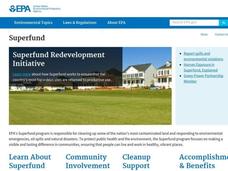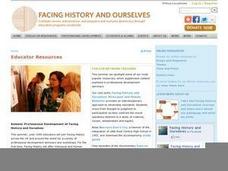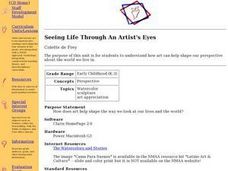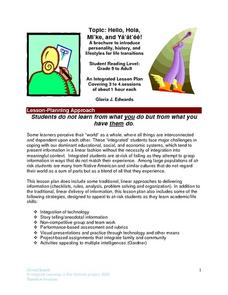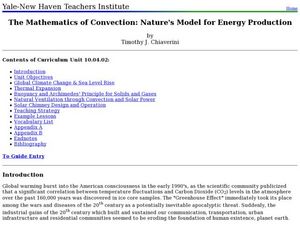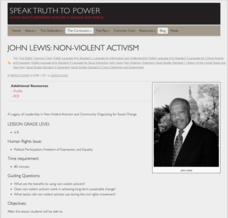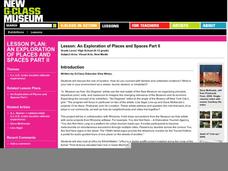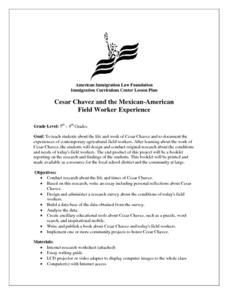Curated OER
Pollution Prevention
Students investigate how to reduce solid and hazardous waste, and estimate the amount of household hazardous waste in their community. Students discuss methods of changing people's habits, and how to convince them to use alternative...
Curated OER
Building a "Toolbox for Difference"
Young scholars discover how race and gender relate to their sense of civic obligation. As a class, they create a 3-D toolbox for making a difference in their community or the world. They write an essay to accompany it explaining the...
Curated OER
Explore Your World--Geography Takes You Places
Students examine how the world around them is constantly changing. In groups, they travel between centers in their classroom to role play the role of explorers in Washington D.C. They share their experiences with their classmates and...
Curated OER
Seeing Life Through An Artist's Eyes
Pupils examine how art can change the way they look at their lives. After being read a book, they discuss the importance of art in their world and what would happen if it were taken away. They create a watercolor painting and shares with...
Curated OER
Applying For The Mission
Young scholars participate in a live simulation of traveling through space as part of a large science unit. They are encouraged to go into the community and ask for participation from parents and relatives. Students reflect upon their...
Curated OER
Court Documents Related to Martin Luther King, Jr., and Memphis Sanitation Workers
Students read about the civil rights movement in their textbooks. They engage in a whole-class discussion of how nonviolent direct action can be a powerful tool for bringing about social, economic, or political change.
Curated OER
New Haven's Hill Neighborhood
Ninth graders examine the area around their school known as Hill neighborhood. In groups, they use maps to discover how the area has changed over time and how the city serves its residents. They identify the cause and effect...
Curated OER
Hello And Hola
Fifth graders investigate the concept of change and how it can effect the lives of different people. They use a real experience or hypothetical one to create a brochure on Microsoft Publisher to help someone to make the transition...
Curated OER
Demography of Roosevelt Over Time
Students examine how the demographics of their high school have changed over time. After collecting and graphing data, they write their conclusions. They share their analysis with the class and compare them with others.
National Save
Dating Violence: Are You a Victim?
The teenagers in your class are probably involved in romantic relationships, but are they keeping themselves safe? Guide learners through the warning signs for dating violence with a series of lessons and discussions.
Curated OER
Friendship and Belonging
Students identify and demonstrate various emotions. In this philanthropy activity, students listen to the book, The Brand New Kid by Katie Couric, and brainstorm ideas to help new children feel welcome at school. Students role play the...
Curated OER
The Mathematics of Convection: Nature's Model for Energy Production
High schoolers conduct a series of experiments to investigate density, buoyancy and climate. In this math lesson, pupils design and build a hot air balloon to demonstrate convection. They research and write a paper about solar chimneys.
Speak Truth to Power
John Lewis: Non-Violent Activism
After comparing and contrasting non-violent and violent social movements, your young historians will take a closer look at the work and influence of John Lewis on the civil rights movement. They will then choose a current social justice...
Curated OER
Evaluating Information on Food Labels
What kinds of foods include corn? Corn syrup? Start by viewing a clip of Food Inc. with your middle or high schoolers. Then, study a list of corn-derived ingredients, encouraging your class to see how many food products contain corn. A...
New Class Museum
Lesson: An Exploration of Places and Spaces Part II
How does your location alter or impede your movement? An interesting question posed by two artists, who work to show the restrictions of people in various landscapes. Learners analyze both exhibitions, discuss location and movement, then...
Salt River Project
How Do We Clean Polluted Water?
How do we clean up oil spills and other pollutants in the water? Explore water treatment strategies with a set of environmental science experiments. Groups remove oil from water, work with wastewater treatment, and perform a water...
Curated OER
Nonprofits?
Students distinguish the nonprofit sector from the for-profit sector. They define and give examples of nonprofit organizations, name and illustrate examples in the local community and compare and contrast nonprofits to the for-profit...
Curated OER
Soil: Food Mapping
Students examine the concept of food mapping . In this agriculture lesson, students explore food and agriculture systems in the United States in the past and today. Students complete food mapping activities.
Curated OER
Fact or Hoax? You Decide.
Students analyze the components of debating and practice what they have learned as they conduct a class debate on the lunar landing. Both sides of the issue are researched and presented to the group.
American Immigration Law Foundation
Cesar Chavez and the Mexican-American Field Worker Experience
After researching and learning about the work of Cesar Chavez, your young historians will design a booklet on the conditions and needs of today's field workers and the Mexican-American field worker experience.
Curated OER
Save That Water
Students investigate water conservation. In this environmental lesson, students brainstorm ways they use water and discuss ways to conserve water. Students illustrate and write about their method of water conservation.
Curated OER
These Lakes are Great
Young scholars examine the Great Lakes Basin and water conservation. In this Great Lakes and water lesson, students study the location of the lakes before reading the book, The River Ran Wild. They discuss the associated vocabulary and...
Curated OER
Legends of the Fifth
Students explore the the legends and myths of the Orient, Africa, Europe, Asia, and the Americas in this six lessons unit. Different cultures and belief systems of the inhabitants of these areas are examined through storytelling techniques.
Curated OER
Machines: Designing Form and Function
Students design a boat model with simplified steam engine. In this ecology lesson, students compare renewable and nonrenewable energy sources. They determine the efficiency of their boat model.


